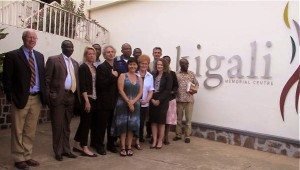On July 17-18, “Genocide and Denial: The Armenian, Jewish, and Tutsi Genocide” was hosted by and held at the Kigali Genocide Memorial Center in conjunction with the National Commission for the Fight Against Genocide (CNLG) in Kigali, Rwanda.

The Memorial Center houses a museum that includes exhibits on the Armenian Genocide, the Holocaust, the Cambodian Genocide, the Bosnian Genocide, and the ongoing genocide in Darfur. The two-day conference featured papers by distinguished scholars from the United States, Europe, and Rwanda. Its primary focus was the analysis of denial as a facet of genocide’s aftermath. The Rwandan media, including Rwanda TV, covered the conference, while the Rwandan New Times ran a feature article titled, “Scholars Discuss Impact of Genocide Denial.”
The master of ceremonies and conference co-organizer, playwright Bianca Bagatourian, called the conference to order on Tuesday morning, July 17, noting that many things, including “the legacies of denial perpetrated by the Turkish state, anti-Semitic groups, and Hutu nationalists, connect the three unambiguous cases of genocide in the 20th century.” Because denial is always an issue following genocide, Jean-Pierre Karegeye, Tom Ndahiro, Jose Kagabo, and Hadley Rose all discussed various dimensions of the denial issue in Rwanda today, and Rose discussed the problems that arise in drafting genocide ideology laws.
Noted Holocaust scholar and conference participant, Deborah Lipstadt, emphasized that “[d]enial of genocide, whether that of the Turks against the Armenians, or the Nazis against the Jews, or the Hutu against the Tutsi, is not an act of historical reinterpretation. Rather, the deniers sow confusion by appearing to be engaged in a genuine scholarly effort. The abundance of documents and testimonies that confirm the genocide are dismissed as contrived, coerced, or forgeries and falsehoods. … Denial of genocide strives to reshape history in order to demonize the victims and rehabilitate the perpetrators.”
Conference co-organizer Peter Balakian later stated that “denialism is the final stage of genocide, as it attempts to falsify history and create a counterfeit universe for the survivors and their legacies, and it must be studied and analyzed in order to be exposed for the ethical problems it creates.”
The conference included a dynamic combination of lectures and presentations that dealt with various facets of genocide and of denial by Dr. Peter Balakian, Colgate University, U.S., on “The Armenian Genocide and Modernity” and “A Fetishized Foreign Policy: Turkish State Denial of the Armenian Genocide”; Dr. José Kagabo, Ecole des Hautes Etudes en Sciences Sociales, France, “Genocide Against the Tutsi in Rwanda: Different Forms of Denial”; Dr. Jean-Pierre Karegeye, Macalester College, U.S., “Denying the Tutsi Genocide: An African Paradigm?”; Dr. Deborah Lipstadt, Emory University, U.S., “To Debate or not to Debate: Strategies for Addressing Genocide Denial–Like Trying to Nail a Blob of Jelly to the Wall”; Dr. Wendy Lower, Claremont McKenna College, U.S., “Landscapes of Destruction and Refuge—Topography of Genocide in Killing Fields of Eastern Europe”; Tom Ndahiro, researcher, IGSC, Rwanda, “When Racial Hatred is Fashionable” and “Bigotry Eulogized”; Dr. Donald Miller, University of Southern California, U.S., “The Role of Survivor Testimony in Countering Genocide Denial: Comparing Oral History Testimony of Armenian and Tutsi Genocide Survivors”; Hadley Rose, Esq., “Re-Drafting Rwanda’s Genocide Ideology Law”; Dr. Gregory Stanton, George Mason University, U.S., “Tactics of Denial: A Comparison of Denial of the Armenian Genocide by the Turkish State and Denial of the Tutsi Genocide in Rwanda by Hutu Power Genocidaires.”
During both days, the audience, which included Rwandans, Europeans, and Americans, showed great interest in the presentations at the Kigali Genocide Memorial Center, which is now central to the cultural life of the city and visited by thousands of tourists annually. The Kigali Memorial Center was established by the Aegis Trust, founded by Dr. James Smith, who also created the Holocaust Memorial and Education Centre in the UK. The staff of the center, led by Solange Umulisa, deputy director, helped make the conference a groundbreaking international event. “Having a scholarly symposium on Armenian, Jewish, and Tutsi genocides and their aftermaths,” Balakian noted, “in an important sub-Saharan African country like Rwanda opens up new pathways for intellectual work.”


I was so surprised to find out how much similarities there are between the Armenian Genocide and the Holocaust. Both had a final solution, with the Armenian being devised at a Young Turks Conference in 1911, and the Holocaust at the Wannsee Conference in 1942. The only thing different about the Tutsi in Rwanda, is that is was not a final solution dictated by a conference, but a massacre, like what happened to the Armenians from 1894 to 1896, and the Jews with the pogroms before World War II.
Tim,
The irony is that not only was the Armenian Genocide similar but many scholars consider it a blue print for the Holocaust.. Also the very word GENOCIDE was coined by Rafael Lemkin using both cases as his reference to him inventing the very word.
The saddest part is, unlike other genocide, the culprits the Armenian Genocide and their decedents continue to use every resource available to deny that the Armenian Genocide ever took place.. And they are not alone as the US State department, The British government and even the Israeli governmnet deliberately help in this denial and coverup..
That is where grassroots action is going to be the great determining factor on this, because the Armenian Genocide has been so thoroughly documented. I have seen archive after archive in Washington, D.C., London, and Jerusalem. In London, it was Arnold Toynbee with White Hall, who wrote volumes upon volumes on the subject. In the United States, it has been the Ford Foundation that provided the grants for it. When I was on the advisory council of the United States Holocaust Memorial Museum, I recommended that it included the Armenian Genocide in the museum, and it did. Maybe official government recognition has not happened yet, but it does have allies. (No pun intended, they knew about it when it first started in 1915.)